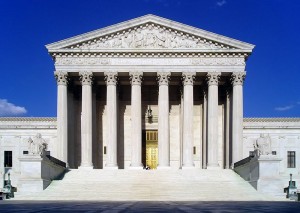Supreme Court to Decide Groundbreaking Church Employment Case
 [Yesterday] the Supreme Court said it would decide a groundbreaking First Amendment case concerning the right of churches and other religious employers to freely choose the people who will lead their congregations, instruct their faithful, and speak for the church. The lower courts agree that these employees cannot sue their employers when that would put the courts in the position of second-guessing the church’s choice of its religious leaders—a rule known as the “ministerial exception”. But the Supreme Court has never before ruled on such a case, and the lower courts are divided over how far the rule extends and which employees are subject to it.
[Yesterday] the Supreme Court said it would decide a groundbreaking First Amendment case concerning the right of churches and other religious employers to freely choose the people who will lead their congregations, instruct their faithful, and speak for the church. The lower courts agree that these employees cannot sue their employers when that would put the courts in the position of second-guessing the church’s choice of its religious leaders—a rule known as the “ministerial exception”. But the Supreme Court has never before ruled on such a case, and the lower courts are divided over how far the rule extends and which employees are subject to it.
The Becket Fund for Religious Liberty, a Washington, DC-based public interest law firm, is representing the defendant in the case, Hosanna-Tabor Evangelical Lutheran Church. Hosanna-Tabor operates a K-8 school located in Redford, Michigan. Teachers at the school are required to serve as Christian role models, integrate faith into all subjects, and lead students in prayer, worship, and religious study.
In 2005, the church dismissed its fourth grade teacher, Cheryl Perich, for insubordination and disruptive conduct in violation of church teaching. Perich –who was a “commissioned minister” in the Lutheran church — then sued Hosanna-Tabor for disability discrimination, claiming that her discharge was based on her narcolepsy, a sleep disorder that typically involves excessive daytime sleepiness. Perich later dropped her narcolepsy claim and is now suing the church only for allegedly retaliating against her for making the original narcolepsy claim. The federal Equal Employment Opportunity Commission has also joined in the lawsuit against Hosanna-Tabor.
The federal district court ruled in Hosanna-Tabor’s favor, but the Cincinnati-based Court of Appeals for the Sixth Circuit held for Perich, ruling that she spent more minutes of the day teaching “secular” subjects than she did teaching religious ones. The key question in the case is whether the government can force the church to reinstate Perich, or whether the First Amendment instead protects the church’s right to select its religious teachers.
“We are confident that the Court will reject the idea that judges should be telling churches who will teach the faith to the next generation,” said Luke Goodrich, Deputy National Litigation Director at the Becket Fund. “If ‘separation of church and state’ means anything, it means the government doesn’t get to pick religious teachers.”
The Becket Fund’s co-counsel in the case is Professor Douglas Laycock of the University of Virginia School of Law, a leading scholar and Supreme Court practitioner in the area of religious liberty. He said the plaintiff in this case should clearly be subject to the ministerial exception. “She taught the religion class. She led the prayers. She led the devotionals, which are acts of worship. She was a commissioned minister teaching religion and leading worship. The fact that she also taught math and reading doesn’t change any of that.”
The case, Hosanna-Tabor Evangelical Lutheran Church and School v. Equal Employment Opportunity Commission, will likely be argued to the Court in fall 2011.

